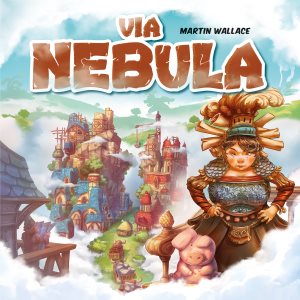
There’s something very cool about Via Nebula which you don’t tend to get in other board games. Yes, there’s the excellent box insert which I’ll discuss later, and yes there’s the awesome wooden components, but it’s an element of gameplay which, at first, seems jolting and weird but soon becomes a crucial gameplay mechanic. Intrigued? You should be.
Via Nebula (which is Latin for “The Fog”, language fans) is, in essence, a game about joining up areas of the board and building things using the resources on offer. Whoever builds five buildings first ends the game, although depending on the points scored elsewhere round the table that not to away they’re the winner. Resources are placed around the board at certain points, and can each be made available by any player who fancies opening up that little stockpile during one of their turns. Nothing drastic so far. But what makes this so challenging and different to what I’ve played before is the fact that once you’ve made some resources available, they’re available to everyone. That means you could wait for ages to open up some resources for a big building you’re putting together, but before you can actually move the resources to your building site they’re all swiped by the other players.
Arse.
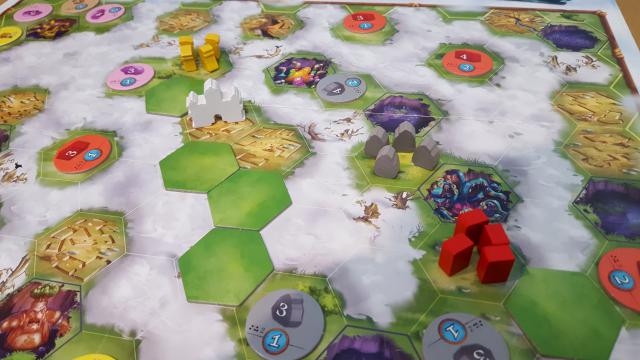
As a result of this the early stages of the game can be quite slow while players are a bit cagey. The board is set up with various hexagonal spaces which depict a meadow, petrified forest, forbidden areas with bubbling pits and nasty looking monsters, ruins or (here comes the name reference) some fog. Each meadow space is given a random exploitation token at the start of the game, which dictate where the resources are available from the off. Players are given a range of things to put on their player board including meadow pieces, buildings and building site tokens, all of which come into play as soon as they take their turn. Each player also gets a couple of private contracts too: building projects which nobody else knows about and can be completed throughout the game to gain more points. The boards, cards and pieces are fantastic, as you’d expect from a Space Cowboys game, and all fit into the box after playing in such a precise way it’s a joy to actually pack the game up at the end of a session. I haven’t seen a box quite like it since T.I.M.E Stories… which coincidentally was made by the same people.
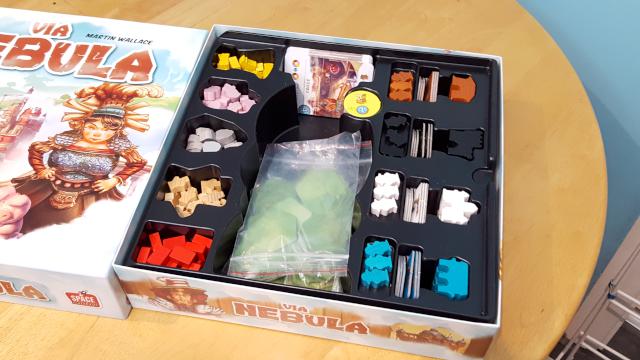
On a player’s turn they can do two actions chosen from six options, such as placing a craftsman (a little wooden dude in your colour) onto an exploitation space – doing so adds the indicated resources onto the board for all to take if they both can, and want to. You can place a building site on a ruin to start a new building, or explore a fog space by placing a meadow token onto one of the areas of fog, just as long as it’s touching another meadow or one of your craftsmen or buildings. You can explore a petrified forest, having the same effect as exploring fog with the exception that it takes both of your actions to do so – it’s a bugger to clear out an old forest y’know. The other two are to do with creating your buildings, which is where the free-for-all nature of the board’s resources comes into its own.
One possible action is to transport a single resource from any area on the board to one of your building sites, just as long as the two areas are joined by a series of empty meadow spaces. Initially this might be ok while people start to forge their own ideas of where they’re going to build, but in a 3 or 4 player game two people can build on the same space, so as soon as you’ve joined up some resources to your building site, you’ve also joined up someone else’s as well. As such what begins slowly while players out their plans together suddenly accelerates with people trying to think ahead, steal crucial resources off people and get their buildings up before anyone else. There’s also the consideration that there are always four contracts on display at the top of the board, which anyone is free to build. As a result it’s possible to take the resources elsewhere to choke a player’s ability to build, and with a limited number of building site tokens available to each player, having a wasted building site can make a huge difference.
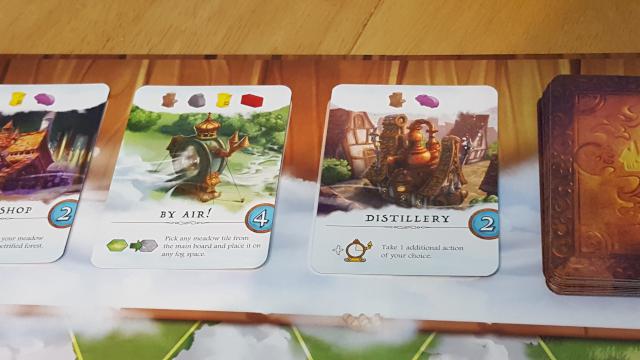
This one mechanic alone makes the game a very different kettle of fish to other competitive games I’ve tried. You desperately want to build that Distillery which lets you take another action and gives you a couple of useful points at the end of the game, but you know for a fact as soon as you make that food resource available someone else will dive in an take it to build their own Caravan and undo your hard work and intricate planning. You can always change what you’re planning to build at the last minute, but any resources on your site that don’t get used when a building is completed go into your storage area and lose you points later, so you need to be careful when changing direction suddenly. It’s a massive risk and reward system, working both ways of course; there’s nothing stopping you doing the same to someone else…
After someone completes their 5th building there’s on last round of turns for everyone before the points get tallied. Any exploitation tokens you’ve taken from the board award points, as do completed buildings. Using up your meadow tokens during the game reveals explorers on your board, again giving additional points, and points are subtracted for any spare resources sat on your own board from slightly bungled building contracts. Once the points are tallied up, you’ve got yourself a winner – it’ll be a deserved winner too; once the game opens up and the board becomes more free-flowing the resources start moving, buildings start going up and it’s very easy to make a mistake and hand the game to another player. It’s easy to play a single game and worry that things are too slow, and when learning the ropes that’s possibly the case, but once your group of players knows what’s going on the opening exchanges happen quite quickly, with no more than 30 seconds passing from one turn to the next. At that point the game comes alive, especially with three or four players, and while you can still have a very enjoyable game with you and one other player, it’s the larger groups which will get the most out of this.
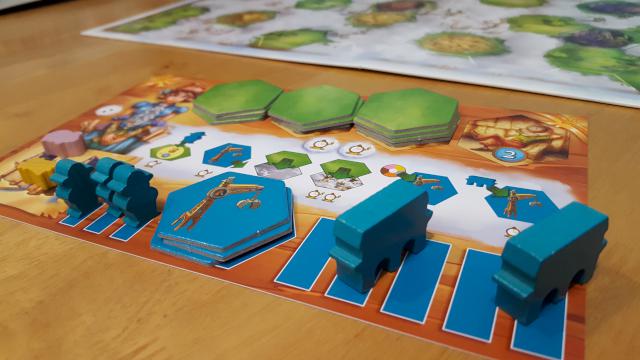
In T.I.M.E. Stories, Space Cowboys produced one of my favourite games I’ve played so far, and Via Nebula is definitely going to stay near the top of my pile of games ready to grab at a moment’s notice as well. These guys know how to make a quality game, and with such easy to learn rules, and a great system of unwittingly helping others by helping yourself, there’s a lot to like here.
Via Nebula
Available Now, RRP £34.99
Find your local stockist here

Leave a Reply